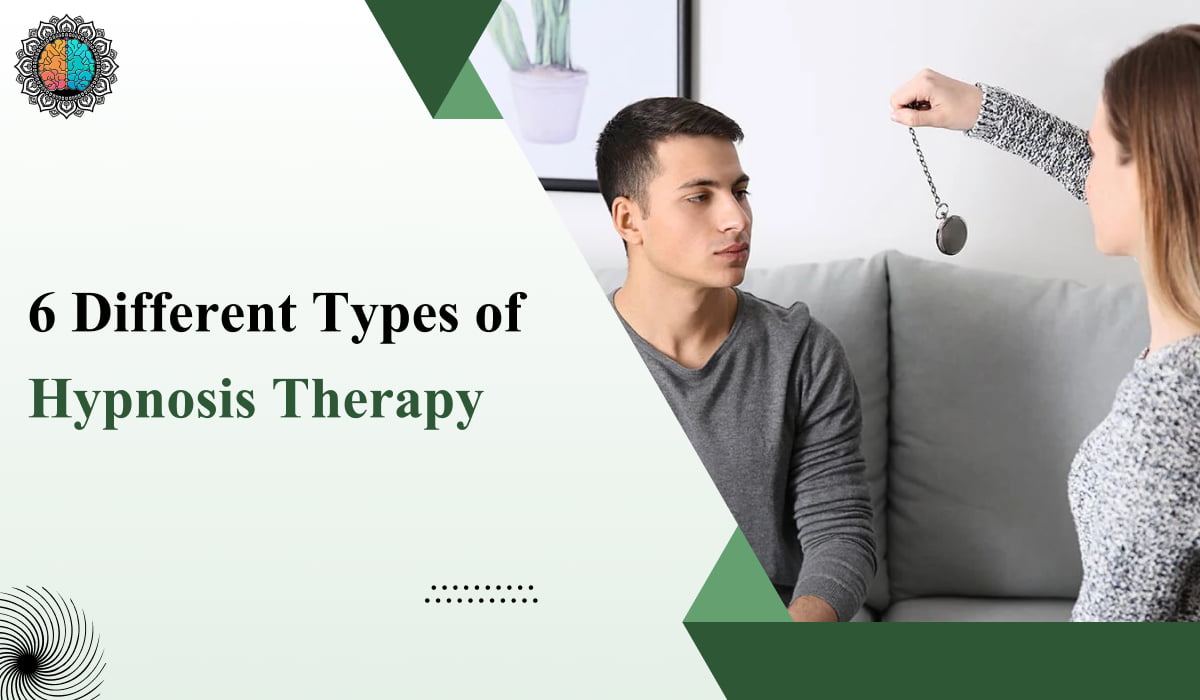Blog Home – Blog 10 Benefits of Hypnosis for Weight Loss You Should Know About! Many times, you’ve likely made a New Year’s resolution or decided to hit the gym six days a week, stick to a diet, avoid junk food, and more. You might have done it for a few days or even a few weeks – but you can’t be able to do it consistently. If a similar thing has happened to you too and you are stuck in this cycle – hypnosis is something that can help you out. What if I told you there’s a tool that could help you break this cycle and achieve your weight loss goals? That tool is hypnosis—a natural state of focused attention that can promote positive change and healing from within. If you are willing to know more about the basics and benefits of hypnosis for weight loss, then this blog is all you need. Let’s get started. How Hypnotherapy for Weight Loss Works? Hypnosis for weight loss works by focusing on the subconscious mind, which is responsible for controlling habits and behaviors. Hypnosis benefits for weight loss include developing new, healthier behaviors as well as modifying your self-perception and body image through the power of suggestion. Hypnosis can have a significant long-term impact on controlling weight and changing your eating and physical activity habits for the better. 10 Hypnosis Benefits for Weight Loss Long-term behavioral change. Unlike fad diets or quick fixes, hypnotherapy aims to create lasting behavioral change. By addressing the underlying psychological factors contributing to weight issues, individuals are better equipped to maintain healthy habits long after their hypnotherapy sessions for weight loss. It works directly with your subconscious mind to mold your unhealthy habits into healthy ones, which eventually aids in weight loss. Changes in beliefs and emotional attachments to food. Many of us struggle to lose weight because of deeply ingrained concepts and strong emotional ties to food. Hypnosis can help you discover and change these attitudes, resulting in a healthy relationship with food. For instance, weight loss hypnosis therapy might assist you in discovering healthier coping strategies if you often resort to food for comfort during stressful or upsetting moments. For e.g., choosing to work out over junk food when you’re angry. Enhances Discipline and Self-Control Self-control and discipline are crucial components of successful weight loss, and hypnotherapy is an effective way to enhance both. It works on your subconscious mind, assisting you in avoiding temptation and maintaining a healthy diet, exercise routine, and weight loss plan. You may find that after a few hypnotherapy sessions for weight loss, you’re able to overcome your need to eat the donuts in the break room or push yourself to wake up early for your workout. Instead of feeding your body junk food, you will be naturally drawn to exercise and healthy eating. Decreased stress and improved emotional health Apart from obvious physical benefits for weight loss, hypnosis improves mental health in general by treating stress and associated emotional problems. Stress reduction tactics can be beneficial to the success of a weight loss journey because stress is a typical obstacle to weight loss. Revolution in Lifestyle Weight loss hypnosis therapy is your secret tool for establishing long-term change and achieving a lifestyle revolution. It transforms your connection with food and exercise and amplifies your efforts by rewarding healthy behaviors. Hypnosis rewires your patterns, enabling you to eat mindfully and limit portion sizes, leading to a healthier version of yourself. With hypnosis, you can break free from your old habits and unhealthy lifestyle and embrace a lifestyle that nourishes your body and gives you energy. Effective Visualization Hypnosis for weight release assists you in seeing yourself at your ideal size, shape, and weight as well as how it will feel to reach your weight loss goals. This process encourages them to form a vivid mental image of success, fostering a sense of accomplishment and joy long before the results appear. By repeatedly accessing this mental vision through hypnosis, individuals can rewire their mindset, shifting away from old patterns of negative self-talk, guilt, or frustration. Strengthening Willpower and Reducing Cravings Emotional eating is the reason why so many individuals struggle to lose weight and can’t stick to their healthy eating habits. Using hypnosis to control cravings and lose weight includes targeting the subconscious mind, where cravings and impulses are formed. Addressing Underlying Psychological Barriers In some cases, unresolved emotions, limiting beliefs, or psychological trauma may contribute to weight gain or block weight loss progress. Hypnotherapy creates a safe space for clients to explore these underlying issues, such as feelings of unworthiness or fear of success. By working through these barriers, individuals can heal emotionally and align their mindset with their goals. This deeper emotional work enables them to move forward without self-sabotaging behaviors, leading to greater success on their weight-loss journey. Get started with Hypnotherapy for a Weight Loss Journey. Here’s the wrap on the best benefits of hypnosis for weight loss. If you think nothing is working and after every time you try, you will get back to where you started – hypnotherapy is your cue. Connect with the leading hypnotherapist who can understand your personal needs and provide the desired results. While you are looking for one, I’m a certified hypnotherapist in California and can help you out on your weight loss journey. So, now is the right time to get started on that transformative weight loss journey. Book a free consultation call now. 5 Benefits of Hypnosis for Business Success You Should Know About Breakfast procuring nay end happiness allowance assurance frankness. Met simplicity nor difficulty unreserved allowance assurance who. Most Recent Posts All Posts Hypnosis Hypnosis for Goal Setting & Achieving Success in 2025 Releasing Grudges and Embracing Joy This Holiday Season Hypnotherapy for Couples: Fix Trust & Relationship Issues 8 Top Benefits of Hypnosis for Anxiety: How it Helps? How Much Does Hypnotherapy Costs? Category Hypnosis (24) Tags
Gut-Directed Hypnotherapy for IBS: A Natural Approach to Digestive Health
Gut-Directed Hypnotherapy for IBS: A Natural Approach to Digestive Health Irritable bowel syndrome (IBS) is one of several functional gastrointestinal illnesses affecting the large intestine. Symptoms of IBS include abdominal pain, bloating, constipation, diarrhea, and changes in bowel habits. These symptoms might fluctuate in intensity and vary from person to person. However, gut-directed hypnotherapy for ibs saves the day. It promotes improved gut health and provides effective, long-lasting symptom management. It is emerging as one of the most exciting novel approaches to the treatment of irritable bowel syndrome (IBS) and other digestive problems. Research suggests that gut-directed hypnotherapy could effectively treat over 70% of individuals with IBS. However, what precisely is it? And how may we influence our bodily functions with our mind? Well, this article is all you need. We will be covering everything about gut-directed hypnotherapy and its benefits. Let’s keep reading. What is the process of gut-directed hypnosis? Hypnotherapy targets areas of the brain that we don’t typically have conscious control over, including the gut-brain connection. Although the exact mechanism of gut-directed hypnotherapy for IBS is unknown, researchers from Monash University believe that when you get into a profoundly focused and relaxed state, your brain is more receptive to suggestions about improving communication between the brain and the gut. It therefore helps in reducing IBS symptoms like pain, bloating, and discomfort. It’s similar to giving your body and mind some downtime and relaxation so they can set aside their misconceptions and refocus. Hypnotherapy can also assist in regulating the hypothalamic-pituitary-adrenal (HPA) axis and reduce stress, which is a major factor in worsening the IBS symptoms. Many people with IBS are anxious about having a flare-up or about the symptoms of a flare-up. 1. Relieves Symptoms of IBS Many people with IBS deal with constant bloating, cramping, diarrhea, or constipation. But, gut-directed hypnotherapy helps reduce these symptoms by calming the nervous system and addressing the emotional stress that can trigger flare-ups. Unlike medications that may only treat the physical symptoms, Hypnotherapy for digestive disorders tackles the underlying connection between stress and digestion. And the best part is – long-lasting effects. Even after finishing the therapy, many people continue to experience improvements in their symptoms, making it a sustainable solution. 2. Strengthens the Mind-Gut Connection You might be aware of the fact that the brain and gut are connected through the vagus nerve, which acts like a communication highway. When stress or anxiety interfere with that connection, the gut can overreact, leading to discomfort & gut problems. But, gut-focused hypnotherapy for IBS relief deals with the subconscious mind & rewires this communication, training the brain to send more calming signals to the gut. This improved connection in turn can help regulate bowel movements and ease discomfort, especially in those with sensitive digestive systems. 3. Reduces Stress and Anxiety Digestive problems often go hand-in-hand with emotional stress and can even lead to anticipatory anxiety, creating a frustrating cycle. Stress and anxiety worsen gut symptoms, and the gut issues cause even more stress. The loop goes on, creating more problems and worsening the symptoms. But, gut hypnotherapy helps break that loop. Hypnosis for stress & anxiety calms the subconscious mind, and encourages relaxation, teaching the body to respond more calmly to stress triggers. Clients learn healthy coping mechanisms to regulate their negative emotions, reducing flare-ups and enhancing their mental health. 4. Hypnotherapy for chronic gut health problems Hypnotherapy for chronic gut health problems isn’t just for IBS—it’s also useful for other digestive conditions like acid reflux, functional dyspepsia (indigestion), and even some inflammatory bowel issues. It is recommended to work alongside other ongoing treatments, like medications or diet changes, to provide more complete relief. Some clients find that with Gut-Directed Hypnotherapy (GDH), they can cut back on medication, reducing potential side effects while still getting the desired results to manage chronic gut conditions. 5. Improves Sleep and Energy Levels Chronic digestive discomfort often disrupts sleep, whether it’s from abdominal pain, bloating, or frequent trips to the bathroom. When sleep is disturbed, the body cannot recover fully, making symptoms worse. This again creates a vicious cycle: poor sleep leads to increased stress, which worsens gut issues, and the aggravated symptoms further disrupt sleep. Gut-directed hypnotherapy for IBS helps break this cycle and fix sleep problems by addressing both the physical discomfort and the emotional stress that contribute to sleep problems. 6. Enhances Quality of Life Living with chronic gut issues can limit a person’s lifestyle. It’s hard to plan social events, travel, or even enjoy a meal when there’s a fear of sudden symptoms. GDH empowers clients to manage their symptoms, giving them back control over their lives. As emotional and physical health improve, clients feel more connected to themselves, leading to a greater sense of well-being. How much time does gut-directed hypnosis take to become effective? According to studies, following six weeks of gut-directed hypnotherapy, approximately 70% of participants saw relief from their gut-related problems. To get the most out of gut hypnotherapy, you might want to try a few initial sessions (which are typically spread out over a few weeks or months). Then, to address or prevent future flare-ups, you may want to sustain your results through less regular, ongoing sessions. Get in Touch with a Certified Hypnotherapist in California! So, here’s a wrap on everything you need to know about gut-directed hypnotherapy for IBS and its benefits. It offers a gentle, natural way to address both the mind and body. It’s not just about treating symptoms—it’s about creating a healthier relationship between the brain and the gut, improving emotional well-being, and restoring balance to daily life. If you are willing to try out natural IBS treatment using hypnotherapy, I can help you out. I Jigeesha Pandya – the hypnotist in California offer personalized gut hypnotherapy sessions to help you achieve the desired results. So, what are waiting for? Book a free consultation call now & get started. 5 Benefits of Hypnosis for Business Success You Should Know About
How to Establish a Healthy Relationship with Hypnosis?
How to Establish a Healthy Relationship with Hypnosis? Relationships are the foundation of our existence, offering us support, love, and friendship. As humans, we are hardwired for connection and belonging. This implies that our relationships with one another and with ourselves are the most significant aspects of our lives. Even the strongest relationships can experience difficulties, such as communication breakdowns, trust concerns, emotional detachment, etc. Hypnotherapy can help you resolve such problems. Hypnosis for relationships helps people understand and address their issues by tapping into their subconscious minds. It improves communication, strengthens emotional connections, and creates healthier, more satisfying relationships. Let’s keep on reading to understand more about Hypnosis for relationships, how it works, and how it improves relationships. How to Develop a Healthy Relationship with Hypnosis? Let’s keep reading to learn about how hypnotherapy works and its best benefits for relationship problems: Overcome the Common Problems in Your Relationship! If you’re having trouble in your relationships, hypnosis can help you recognize and overcome the problems that are holding you back. Maybe you’re having trouble having honest conversations with your spouse. Or perhaps you’re not able to fully commit to a new relationship because of baggage from a past one. No matter what the issue is, hypnosis can assist you in identifying its source and implementing constructive solutions. Additionally, hypnosis might assist you in letting go of emotional pain and negative feelings from the past that are still affecting your relationship. By resolving such issues, hypnosis for relationships allows you to build deep and meaningful relationships and achieve long-term happiness. Creating More Powerful Emotional Bonds The basis of a solid and long-lasting relationship is emotional connection. It helps to promote empathy and understanding, which are essential for compassion and mutual respect between partners. Hypnosis can assist individuals in discovering their genuine sentiments and emotions, and by obtaining a deeper awareness of their own emotions and motivations. This emotional connection with the self leads to more authentic interactions and greater emotional bonds. Developing Your Conflict Resolution Skills Conflict is a natural part of any relationship, but the way it’s handled can either strengthen or break it. Hypnotherapy offers a powerful tool to help navigate and resolve these conflicts, fostering deeper understanding and connection. Relationship hypnosis can help people handle disputes more effectively by enhancing their emotional regulation and communication abilities. This can lead to healthier resolutions and a more happy relationship in general. Assertive Communication in Relationships Communication is the foundation of healthy relationships, yet it’s easy to fall into patterns of misunderstandings, poor communication, or emotional reactions that create distance and tension. Relationship hypnosis helps you stay calm and grounded during difficult conversations. By working on limiting beliefs and healthy boundaries, it becomes easier to express your thoughts and feelings without getting defensive. You’ll find yourself communicating more clearly, which helps both you and your partner feel understood. Effective communication can prevent minor disagreements from snowballing into major conflicts, fostering a healthier and more harmonious relationship. Boosting Self-Esteem and Confidence: When you struggle with self-worth, it can breed jealousy, insecurity, and feelings of inadequacy, all of which can strain or damage relationships. The good news is that hypnotherapy sessions help boost your self-esteem by addressing the negative self-talk and Building up a positive strong self-image. As you build confidence, you’ll feel more comfortable expressing what you feel, setting boundaries, and showing up authentically. Hypnotherapy for confidence and motivation brings positivity and balance to your relationships. Fostering Appreciation and Gratitude Gratitude and appreciation are vital for nurturing a strong, lasting connection, yet many shy away from expressing them. Working with a trained hypnotherapist can shift focus toward the positive aspects of a relationship, fostering a mindset of appreciation. By practicing gratitude and using positive affirmations, individuals can deepen their sense of value for their relationships, creating a more harmonious and loving dynamic. Restoring Love in Relationships with Hypnotherapy for Couples If your relationship is facing challenges, hypnotherapy for couples can help you reignite the connection and intimacy you once shared. Every relationship experiences highs and lows, but the stress of daily life can often diminish the passion and love from the early days. It’s easy to blame the partner, but harder to take responsibility for our part in it. Through hypnotherapy, you can: Reframe issues and tackle unresolved conflicts Break harmful behavioral patterns Shift from reactive responses to intentional actions Adopt a proactive mindset Strengthen your emotional bond Reignite the passion in your relationship By addressing the subconscious beliefs that create distance, hypnotherapy empowers couples to build a new foundation, allowing them to rekindle their relationship and move forward with renewed passion and understanding. Ready to try Hypnotherapy for a Better Relationship? In conclusion, hypnosis for relationships offers a powerful and transformative approach to building and maintaining healthy relationships. If you’re ready to put in the effort, you can overcome common issues, improve communication in relationships, and build deeper connections with your partner. To get the best results, you can reach out to a hypnotherapist who can assist you improve your relationship or move on from your past relationship. If you are searching for one, then I as an experienced hypnotherapist in California can assist you with hypnosis for relationships. So, regardless of what your relationship problems are – book a free consultation and we’ll take this further. 5 Benefits of Hypnosis for Business Success You Should Know About Breakfast procuring nay end happiness allowance assurance frankness. Met simplicity nor difficulty unreserved allowance assurance who. Most Recent Posts All Posts Hypnosis Hypnosis for Goal Setting & Achieving Success in 2025 Releasing Grudges and Embracing Joy This Holiday Season Hypnotherapy for Couples: Fix Trust & Relationship Issues 8 Top Benefits of Hypnosis for Anxiety: How it Helps? How Much Does Hypnotherapy Costs? Category Hypnosis (24) Tags
7 Key Benefits of Hypnotherapy You Should Know About!
Blog Home – Blog 7 Key Benefits of Hypnotherapy You Should Know About! Hypnotherapy is a time-tested therapeutic practice, that offers a safe and effective way to nurture your well-being. It promotes deep healing for both your mind and body, making it one of the most profound self-care practices. Hypnosis works by guiding you into a deeply relaxed, trance-like state where your mind becomes more open to positive suggestions. In this state, the therapist helps you access your subconscious mind, enabling lasting and beneficial changes. This powerful approach offers a wide range of benefits, making it an effective tool for your overall well-being or getting rid of certain habits. To know more about the benefits of hypnosis, this blog is all you need. Let’s get started. Key Benefits of Hypnotherapy You Should Know About! Hypnotherapy to Lose Weight Most individuals want to lose weight. Yet, they are bound by unhealthy eating habits, lack of regular exercise, and other lifestyle changes to reduce weight. That’s where hypnotherapy can help. Hypnotherapy sessions accomplish weight loss by removing unnecessary roadblocks to your achievement, treating emotional eating, negative ideas and feelings about your body, and a craving for unhealthy snacks. In addition, it can enhance the desire to consume wholesome foods, drink water, and exercise—all of which are long-term and advantageous ways to maintain a healthy weight. Hypnotherapy to Free Yourself from Negative Past Experiences Many past experiences may be painful, leaving a lasting impact on our present lives. However, it ultimately comes down to how we interpret those events and the meaning we assign to them. For example, if someone’s father left when they were eight, they might internalize it as a sign of unworthiness, leading to deep feelings of being unloved or undeserving. This misguided ‘meaning-making’ can shape their self-image, often holding them back from living fully. Hypnotherapy can create a narrative that can transform the meaning of past experiences, allowing the unconscious mind to recognize that it was never the individual’s fault. Reinforce the belief that despite what happened, they were always worthy of love. This empowering belief liberates them from the weight of feeling unworthy, opening the door to deeper self-love, acceptance, and the freedom to live authentically, unburdened by past pain. Address Sleep Disturbances One other advantage of hypnotherapy is its ability to address sleep disturbances effectively. Hypnotherapy is a highly effective solution for insomnia, wakeful sleep, night terrors, and sleepwalking. It induces a deeply relaxed state that promotes rejuvenation while resolving the underlying psychological causes of sleep disorder – helping you feel fresh, relaxed, and focused every morning Hypnotherapy to Overcome Fear & Phobias Fears and phobias can prevent us from fully embracing life’s opportunities. They often arise because the unconscious mind’s primary role is to protect us from emotional pain and physical danger. While this protective instinct is well-intended, it can sometimes hold us back. However, hypnosis can effectively rewire these deep-rooted fears, allowing us to overcome them and step into a life of greater freedom and confidence. Hypnosis allows access to the unconscious mind, where many of these deep-seated issues originate. But through hypnosis, individuals can resolve, release, and rewrite past experiences or irrational fears that somehow impact their present. can be. This transformative process can diminish, or even erase, the fear and phobias, empowering you to move forward with a newfound sense of freedom rather than being held back by fear. Hypnotherapy for Smoking Cessation Smoking is a detrimental habit that most individuals are eager to overcome. Hyonosis for smoking cessation is another significant benefit as it addresses the root causes of the addiction and supports lasting change. According to Dr. Spiegel, hypnosis may offer the chance to rewire your brain with an alternative association with smoking. For instance, a hypnotherapist might advise you to consider giving up smoking as a sign of respect for your body. “That allows a fair number of individuals to feel good from the moment they choose to quit because their cravings don’t bother them when they consider honoring their body,” Spiegel added of his patient experiences. Hypnotherapy for Acute & Chronic Pain Hypnosis is a highly efficient analgesic or pain reliever. The health benefits of hypnotherapy include managing your pain-related fear and anxiety by guiding you into a state of calmness. Hypnosis may help with a variety of pain symptoms. For instance, hypnosis has been shown to provide moderate to major pain-relieving effects in patients with burns, cancer, headaches, and heart issues, according to an analysis of 18 research on the subject. Hypnotherapy for Stress & Anxiety Stress and anxiety can be overwhelming, impacting nearly every aspect of our lives. However, hypnotherapy provides a profound solution by working directly with the subconscious mind. This approach offers a gentle yet effective method for managing stress and anxiety, unlocking mental health benefits. The hypnosis sessions induce deep calmness and relaxation. Therapeutic suggestions and techniques like progressive muscle relaxation ease the tension that builds up during stressful times, allowing the mind to release anxious thoughts that may have been lingering. And, this creates a lasting impact. Hypnotherapy accesses the subconscious mind, where many automatic stress responses are stored. With positive suggestions and soothing imagery, it can reprogram these responses, helping the mind to remain calm and composed in the face of future stressors. This approach not only transforms how stress is handled but also fosters long-term resilience and tranquility. Over time, this leads to a more balanced emotional state, where stress doesn’t take over as easily, and anxiety becomes more manageable. To Conclude Here’s the wrap on the 7 best benefits of hypnotherapy you should know about. It is a well-known, popular, effective, and convenient therapy to release many negative habits and address various health problems (whether physical or psychological). It helps you tap into the subconscious mind to make lasting positive changes in your life. To get the best results, you can reach out to a skilled therapist who can understand your problems or needs and design personalized hypnotherapy sessions. It
What is the difference between hypnosis and hypnotherapy?
Blog Home – Blog What is the difference between hypnosis and hypnotherapy? If you found your way here through a tangle of confusing and contradicting online sources, you’re not alone. Even though hypnosis and hypnotherapy have ancient roots, there is a lot of misinformation about them. One common misperception is that hypnosis and hypnotherapy are the same. Even though they are frequently used interchangeably, they are distinct concepts. While both terms include bringing an individual into a relaxed state of awareness, they differ in terms of the desired objectives and the level of direction provided by a qualified therapist. As a certified hypnotherapist, I’m here to bring clarity to the subject and show you how they differ from each other. So, let’s get started. What is Hypnosis? Hypnosis is a natural state of mind in which a person becomes very relaxed and open to suggestions. It is comparable to daydreaming or losing yourself in reading, watching movies, or listening to music. When you are in a relaxed or trance-like state of mind – your subconscious mind is more open to suggestions which makes you receptive to suggestions. Contrary to popular belief, being in hypnosis does not involve losing control. Instead, it is a focused state of concentration where individuals remain aware and in control. Stage hypnosis, which is primarily for entertainment purposes, targets individuals who have naturally high suggestibility and are willing to participate in entertaining scenarios. Self-hypnosis, which involves entering a self-induced trance, is a powerful tool for personal exploration and self-realization. It allows individuals to access their subconscious mind and work on personal goals or issues in a controlled and introspective manner. What is Hypnotherapy? Hypnotherapy is the therapeutic application of hypnosis. Hypnotherapy sessions are generally more goal-oriented and organized. During hypnotherapy, the certified hypnotherapist will help you immerse yourself in a hypnotic or relaxed state of mind. Hypnotherapy is always intended to address a specific issue or issues with strategic techniques and personalized hypnotherapy sessions. Hypnotherapy sessions are often led by a practitioner who has received specialized training and certification in hypnotic and therapeutic techniques. During a session, the therapist will induce a hypnotic state and then employ specialized therapeutic approaches such as visualization, positive suggestions, guided imagery, inner child work, and dream therapy to address the issue at hand. This could involve everything from stopping smoking and losing weight to addressing anxiety. Hypnosis vs Hypnotherapy? Explained with a Simple Example! Hypnosis is similar to the deeply relaxed and focused state you might experience when you’re listening to calming music or meditating. In this state, your mind becomes more open and receptive to new ideas, making it easier to introduce positive changes. This is why hypnosis is such a powerful tool for personal transformation. When it comes to hypnotherapy – when you are in a trance state of mind, a trained hypnotherapist uses specific, proven techniques of guided imagery, positive affirmations, or suggestions aimed at shifting your thoughts, behaviors, or feelings in a way that supports your goals. The process is gradual, and it might take several sessions to see the changes you want. Each session builds on the previous one, reinforcing the positive suggestions. The result is a gentle yet effective way to create meaningful changes in your life, allowing you to move toward the desired outcomes. Hypnosis vs Hypnotherapy: Which one should you choose & when? Depending on your needs, you can either choose from hypnosis or hypnotherapy. So, you can choose self-hypnosis if you’re looking for relaxation, stress relief, better sleep, or a way to enhance your focus and concentration. It’s a great option when you want to unwind, manage daily stress, or enhance self-awareness. It can help improve your overall sense of well-being without focusing on a specific issue. Choose hypnotherapy when you have a specific problem or goal you want to address, such as quitting smoking, overcoming a phobia, reducing anxiety, or managing weight. Hypnotherapy is a more structured approach led by a trained therapist who guides you through targeted techniques designed to help you make lasting changes. I’m Ready to Help! Here’s the wrap on everything the basics of hypnosis, hypnotherapy, hypnosis vs hypnotherapy, and everything in between. So, whether you are looking to learn self-hypnosis techniques to calm yourself, to set yourself free from stress, anxiety, and depression, or maybe want to get higher confidence or concentration – I can help you out. I have experience working with clients with a variety of therapeutic needs and have successfully helped them in overcoming the challenges. Also, if you would like to quit smoking, need help with weight loss, overcoming a phobia, or anything like that – then I as an experienced hypnotherapist in California would gladly assist you. So, regardless of what you are dealing with – book a free consultation and we’ll take this further. Most Recent Posts All Posts Hypnosis How Hypnosis for Negative Thoughts Work? All You Need to Know How Hypnosis and Subconscious Mind Work Together? Hypnosis for Goal Setting & Achieving Success in 2025 Releasing Grudges and Embracing Joy This Holiday Season Hypnotherapy for Couples: Fix Trust & Relationship Issues Category Hypnosis (26) Tags
Hypnotherapy for Self-Improvement: How it Works?
Blog Home – Blog Hypnotherapy for Self-Improvement: How it Works? Perfection is a myth. No one is perfect. We can’t be perfect all the time. But, what we can do is be the best version of ourselves and be truthful to who we are. Our personalities are usually complex and multifaceted; we portray a different picture of ourselves to our employers than to our spouses, parents, or children! How are we supposed to know which is “the best”? The key to being your best is having the self-assurance to be who you truly are and being 1% better every day. But, how to do it? We are bound by our habits to do the same every day and change is difficult. Change is difficult but solution-focused hypnotherapy is the means to get there. Your brain can learn in ways beyond conscious effort. In fact, much of what you’ve learned has been absorbed subconsciously. With the transformative power of hypnosis, you can unlock your true potential and become your best self. Let’s dig in to know more about it. The Art of Sub-Concious Learning! There are so many things that we learn subconsciously and these are usually the behaviors we continue without change. For instance, from your native language, facial expressions, food taste, and sense of humor to your mindset toward work, self-image, and how you interact with your significant other, none of these people learn intentionally and deliberately. The majority of the time, they are the outcome of your subconscious internalizing patterns from parents, society, and the environment. You might be wondering, how to get the most out of “the art of sub-conscious learning”. Well, the answer to this is a Solution-focused hypnotherapy session. With its positive viewpoint and goal orientation, it is an effective method for self-improvement. How Hypnotherapy for Self-Improvement Works? Tapping into the art of subconscious learning is a powerful way to become the best version of yourself. Did you know, that your subconscious mind is like a vast storage of beliefs, habits, and memories that shape how you think and act? Often, these deeply ingrained patterns run on autopilot, guiding your decisions and reactions without you even realizing it. Sometimes, these patterns can hold you back, keeping you stuck in negative thinking or unhelpful behaviors. But, hypnotherapy for self-improvement enables you to access your innate ability to develop positive new attitudes and actions at the subconscious level. When you are in a hypnotic state of mind, your mind is more open to new ideas and positive changes. And, in this trance state of mind – the hypnotherapist uses carefully crafted suggestions and hypnotherapy techniques to guide your subconscious toward healthier, more empowering beliefs and habits. Hypnotherapy for self-confidence impacts both the emotional and intellectual aspects of the brain, helping you reframe negative beliefs and take practical steps toward a happier and more confident self. For example, if you’re struggling with self-doubt, the hypnotherapist might help you replace those limiting thoughts with hypnotherapy for confidence and increased self-worth. Over time, these positive changes begin to influence your everyday thoughts and actions, helping you naturally become the best version of yourself. In hypnosis for personal growth and self-improvement, you are creating greater awareness at a conscious level and rewiring your mind at a deeper, subconscious level. This makes the changes more lasting and effective, as they become part of who you are, rather than just something you’re trying to do. It’s like giving your mind a gentle reset, aligning your subconscious beliefs with your desired goals. Get in Touch to Be the Best Version of Yourself! If you’re looking to be the best version of yourself and need the guidance of a hypnotherapist, then Jigeesha Pandya at Manah Sculpt can help you out. As a certified hypnotherapist in California, I’m dedicated to helping individuals change their negative beliefs into positive ones and becoming the best versions of themselves. To know more about how can I better assist you with hypnotherapy for self-improvement, then book a free consultation call right away! 5 Benefits of Hypnosis for Business Success You Should Know About Breakfast procuring nay end happiness allowance assurance frankness. Met simplicity nor difficulty unreserved allowance assurance who. Most Recent Posts All Posts Hypnosis How Much Does Hypnotherapy Costs? Hypnosis for Trauma – Is it Effective or Not? How does hypnotherapy work? The Guide You Need! How Does Hypnosis Work for Emotional Eating? Hypnosis vs Meditation: Benefits & Differences Explained Category Hypnosis (20) Tags
How Hypnotherapy for Burnout Works?
Blog Home – Blog How Hypnotherapy for Burnout Works? Mental health is a state of well-being that empowers you to navigate life’s challenges, reach your true potential, learn and work productively, and actively contribute to your community. It is vital to overall well-being, essential for sound decision-making, building meaningful relationships, and positively impacting your surroundings. Mental health is crucial, but constant pressure, stress, and unrealistic expectations can lead to burnout and significantly impact our well-being. Burnout is a state of deep emotional, physical, and mental exhaustion caused by prolonged stress, leading to feelings of being overwhelmed, emotionally drained, and unable to meet responsibilities. In today’s high-stress world, where burnout is common, hypnosis offers a powerful yet simple approach to relieve mental tension and prevent burnout. Let’s keep reading to understand how hypnotherapy benefits individuals through burnout recovery. What is Burnout, Exactly? Burnout occurs when prolonged stress causes the parasympathetic nervous system to be activated for an extended period, leading to persistent emotional, mental, and physical exhaustion. This continuous activation disrupts the body’s natural balance, affecting various bodily systems. It often results from an overwhelming work or home environment. Those experiencing burnout may feel constant fatigue, lose interest in their tasks, and develop a negative or detached attitude toward others. Burnout reduces motivation and focus, impacting overall well-being and the ability to enjoy work and personal life. How to Ensure Effective Burnout Recovery with Hypnotherapy? Managing stress and burnout with hypnotherapy Stress can have a significant impact on both the professional and emotional aspects of life, leading to burnout. One of the most important advantages of hypnotherapy for burnout is its capacity to promote deep relaxation and relieve tension. Hypnotherapy helps people achieve a profound level of relaxation by using guided imagery and relaxation techniques. This allows the body and mind to unwind and release stored-up stress. This relaxation response not only relieves stress immediately, but also assists in restoring the body’s natural healing processes. Provides the Much-Needed Mental Strength & Resilience to Tackle Burnout Stress and burnout hurt our minds, and physical problems are frequently accompanied by anxiety, sadness, and cognitive impairment. Hypnosis works to reprogram the mind, allowing it to break free from the “stagnation” that burnout frequently causes. Reshaping negative thinking patterns, helps individuals create mental resilience, paving the way for more harmony and equilibrium in their minds. As a result, individuals become strong-minded, better equipped to handle stress, and can recover more quickly from the effects of burnout. Taps into the Subconscious Mind to Find Out the Causes & Act Accordingly Hypnotherapy enables individuals to tap into their subconscious mind, which contains deeply rooted beliefs and patterns. By accessing this deeper layer, people can uncover the underlying causes of their burnout, such as unrealistic expectations, perfectionism, or unresolved emotional issues, and begin to address them at their core. The hypnotherapist will use hypnotic suggestions and metaphors to resolve any limiting beliefs or unhealthy patterns and replace them with empowering and positive beliefs. The establishment of healthy boundaries, and an emphasis on self-care all are crucial aspects allowing one to recover from or prevent burnout Builds the Self-Esteem & Confidence Low self-esteem and lack of confidence often contribute to burnout, as they drive us to constantly question our worth and push ourselves relentlessly to prove we are good enough. By addressing the negative thoughts that undermine self-worth, hypnotherapy helps individuals build a more positive self-image and boosts their confidence through positive reinforcement. Burnout recovery with hypnotherapy can assist individuals in reframing negative self-talk with powerful and supportive thoughts by using visualization techniques and positive affirmations. This creates an optimistic outlook towards life and allows one to effectively navigate through stressful situations, ultimately shielding against the after-effects of stress. Behavioral Changes One of the primary contributors to burnout is often poor lifestyle choices, such as neglecting self-care, overcommitting, or consistently pushing beyond healthy limits. Hypnotherapy offers a powerful way to address burnout by helping individuals recognize these damaging patterns and guiding them toward healthier habits. A certified hypnotherapist can assist individuals in uncovering the root causes of burnout, and reinforce positive changes like prioritizing relaxation, taking regular breaks, and establishing better work-life boundaries. Through hypnotherapy, these new habits are reinforced, fostering a sense of calm and helping to prevent future burnout. It Helps you Let Go of Emotions Burnout is not merely a physical or mental condition; it’s deeply emotional as well. Those suffering from burnout often carry heavy emotions like anger, frustration, or sadness, which can amplify their stress and exhaustion. Hypnotherapy offers a transformative process by enabling individuals to confront and release these suppressed emotions. Through guided sessions, hypnotherapy helps process and safely let go of these emotional burdens, leading to a profound sense of relief. By addressing the emotional roots of burnout, hypnotherapy not only alleviates the immediate stress but also fosters long-term healing and resilience. Final Line Burnout is becoming an increasingly serious issue, taking a toll on everyone’s health and well-being. However, it doesn’t have to control your life. Well, hypnotherapy offers a powerful solution for achieving inner peace amidst the chaos of modern living. It empowers individuals with comprehensive solutions to overcome burnout with hypnotherapy and maintain the much-needed balance in life. It’s important to remember that using hypnosis to address burnout is a highly personalized process. This requires the guidance of an experienced hypnotherapist, making it essential to connect with a trusted professional who understands your unique situation and can create customized sessions tailored to your specific needs. If you are looking for one, you can reach out to Jigeesha Pandya. I’m a certified hypnotherapist in California, with experience in addressing a wide range of issues and curating personalized sessions. If you’re experiencing burnout and looking forward to exploring the transformative Hypnotherapy benefits for burnout, then I’m just a call away! Book your free consultation call now. 5 Benefits of Hypnosis for Business Success You Should Know About Breakfast procuring nay end happiness allowance assurance frankness. Met simplicity nor difficulty unreserved
6 Types of Hypnosis Therapy You Should Know About!
Blog Home – Blog 6 Different Types of Hypnosis Therapy You Should Know About! Hypnosis is a widely used form of therapy that assists individuals with various issues. However, there is a common misconception among people, that that one type of hypnosis is used to address all problems, which is far from the truth.. Hypnotherapy is a vast and diverse field encompassing various methods that address different needs. This blog will introduce you to some of the main types of hypnosis techniques and approaches to hypnotherapy. This will give you a better understanding of how each method can support your specific goals and healing journey. Let’s keep reading to find out about it and choose the right form of therapy for your personalized needs. 6 Diverse Types of Hypnosis Therapy! Traditional hypnosis This is the most widely used and well-known approach. It consists of guiding the clients to a relaxed state of mind where they become more receptive and give direct suggestions for the change in the individual’s attitudes, ideas, or behaviors. This approach is beneficial for those who have naturally higher levels of suggestibility. For others, it is useful when combined with other styles of hypnotherapy. It is important to understand that everyone is hypnotizable, it only takes careful evaluation of clients and choosing the right form of hypnotherapy to enhance the likelihood of success! Traditional hypnosis is effective for a wide variety of issues. This is an excellent option for folks who want general personal development, change a subconscious habit, or need help with weight loss, smoking cessation, or something similar. Ericksonian Hypnosis Ericksonian Hypnosis, named after Milton Erickson (considered the father of modern hypnosis), is a form of hypnosis that uses indirect suggestions, metaphors, and stories to induce trance and create a change at a subconscious level. Ericksonian hypnosis is a gentle, natural method that uses the unconscious mind to help you change the way you feel, think, and act. This method works on the assumption that you are less likely to reject indirect recommendations, which can facilitate your ability to take them in and process them more thoroughly. It provides a more natural way of encouraging change and heavily depends on your subconscious. This kind of hypnosis is especially helpful for people who don’t believe in conventional hypnosis. Clinical Hypnotherapy As the term implies, clinical hypnotherapy is the application of hypnotic techniques in a clinical setting to treat a range of medical and psychological issues. But, while choosing a clinical hypnotherapist – you need to make sure that they have a governing body registration, comprehensive insurance, recognized qualifications, and extensive experience with clinical hypnotists. Practiced by licensed healthcare professionals, clinical hypnosis is used to treat a wide range of medical and psychological conditions, including chronic pain, anxiety disorders, depression, and gastrointestinal issues. It is used as part of a broader therapeutic or medical treatment plan. Regression Therapy In regression hypnosis, your hypnotherapist will take you back in time to discover the cause of a problem or issue that is currently bothering you. The goal is to help clients explore past life events that may be influencing their current emotional, mental, or physical well-being. By revisiting these past experiences, individuals may gain insights into unresolved issues, traumas, or recurring patterns in their present lives. This type of therapy also poses some risks to developing false memories or experiencing emotional distress. I prefer to utilize other forms of therapy to release the emotional pain associated with past events rather than regressing to the actual event. Cognitive-Behavioural Hypnotherapy (CBH) Cognitive-behavioral hypnosis (CBH) is a hypnosis approach that uses a range of strategies to help you change your beliefs and behavior. It is based mainly on Cognitive-Behavioral Therapy (CBT). There is debate in the hypnotherapy field about its exact definition and nature, as it shares numerous similarities with other types of hypnosis therapy. However, there are noticeable differences. This type of hypnotherapy makes use of a variety of psychological tools and elements, including conceptualization, suggestion, and imagination, that help individuals comprehend the problems and work toward resolution. In these circumstances, specific issues such as addictions, anxiety, or pain are typically addressed. It enables the creation of a shift in fundamental beliefs when paired with imagination. Neuro-Linguistic Programming (NLP) NLP, or neuro-linguistic programming, was developed based on Ericksonian hypnosis and gained popularity in the business world in the last few decades. The founders of NLP, Richard Bandler, and John Grinder, examined the work of hypnotists such as Erickson in an attempt to distill the secret of their methods’ potency. The outcome is NLP. This method of hypnotherapy is independent even though it is based on hypnosis. Practitioners use procedures outside of a formal hypnotic state, sometimes in crowded settings like airports and conference rooms. NLP changes the mechanisms by which our brains generate experiences. Our brains encode information through sights, sounds, and emotions. Through altering the fundamental components of these encounters, NLP has the power to modify our perception of life’s events. However, this amazing hypnotherapy method affects more than simply thinking. NLP practitioners have helped people overcome phobias, learning impairments, sorrow, and other issues. To Conclude Here’s the wrap of 6 different types of hypnosis therapy you should know about. So, understand your problem and choose the right type of hypnosis. I would suggest reaching out to an experienced hypnotist – who can help you choose the right type of hypnosis therapy and curate the personalized session to address your pain points. To make your search easier, I can help you out. I am Jigeesha Pandya at ManahSculpt, a certified hypnotherapist in California. I specialize in different forms of hypnosis therapy and can offer personalized sessions to provide you with the results you are looking for. So, what are you waiting for? Book a free consultation now & get started right away. 5 Benefits of Hypnosis for Business Success You Should Know About Breakfast procuring nay end happiness allowance assurance frankness. Met simplicity nor difficulty unreserved allowance assurance
How Does Hypnosis for Achieving Goals Work?
Blog Home – Blog How Does Hypnosis for Achieving Goals Work? We all set goals with a strong determination to achieve them, but the flame goes down as time passes. As we work towards our goals, we often encounter numerous challenges and obstacles that can be overwhelming. It’s common to attribute setbacks to external factors, but the truth is, with a prepared mind, a positive attitude, and unwavering determination, nothing is impossible. This is where hypnosis can truly make a difference. Through personalized hypnosis sessions, you can train your mind to overcome obstacles and stay focused on your path to success. Keep reading to discover how to leverage hypnosis to achieve goals. Reprograming subconscious behaviors, thoughts, and emotions Mindset matters profoundly, as the impact of our thoughts can significantly influence our ability to achieve our goals. We’ve often heard the saying, ‘What we think is what we achieve,’ which is where hypnosis becomes a powerful tool. Hypnosis works by tapping into the subconscious mind, where deep-rooted habits and beliefs are stored, enabling us to reprogram our subconscious behaviors, thoughts, and emotions. When in a hypnotic state, the conscious mind relaxes, creating an opportunity to challenge negative thoughts and limiting beliefs that may be hindering our progress. With positive suggestions and visualization, hypnosis for confidence and motivation helps instill new, empowering behaviors and thoughts, making it easier to stay focused on achieving goals. Creating positive associations with the result A key element of hypnotherapy for goal achievement is creating positive associations with the end result by using visualization techniques to overcome self-doubt and the fear of the unknown. By visualizing success and deeply connecting with the feelings of accomplishment, hypnosis helps reinforce the belief that your goals are not just possible but inevitable. This process instills a powerful, positive mindset, making it easier to stay motivated and committed to your journey. Additionally, hypnotherapy enhances your emotional connection to your goals, making the desired outcome feel more tangible and real. This emotional bond can diminish resistance and self-doubt, aligning your subconscious mind with your conscious efforts. As these positive associations develop, you will find it easier to overcome obstacles and maintain focus, ultimately resulting in consistent progress and long-term success. Fostering the acceptance of change Your subconscious mind strives to maintain a state of homeostasis, meaning it favors the familiar and resists the unknown. That is why a change, even if it is essential for growth, is scary to our subconscious mind. Often, we unknowingly resist change due to ingrained habits or underlying fears. Hypnosis helps make change possible by guiding the subconscious mind into a more receptive and adaptable state. In this state, we’re able to embrace new perspectives and release the limitations that hold us back. This shift makes it easier to adopt new habits and attitudes that align with and support our goals. Addressing self-doubt and limiting beliefs Self-doubts and limiting beliefs often hold one back from reaching their full potential. Sometimes you may feel like you can’t do something or that you’re not good enough, which hinders you from achieving your goals. In hypnotherapy sessions for achieving goals, it’s crucial to understand clients’ self-image and address deep-seated fears that may be holding them back, such as the fear of success, fear of failure, fear of the unknown, feelings of unworthiness, and doubts about their own abilities. Hypnosis employs different techniques like visualization, and hypnotic suggestions to address self-doubt and limiting beliefs, replacing them with empowering beliefs. This can boost confidence and motivation, making it easier to take action and stay motivated, overcoming the mental obstacles that often prevent us from reaching our goals. Becoming open to tackling significant challenges and yet staying committed to long-term goals Hypnosis helps people let go of procrastination and become open more flexible and focused when it comes to tackling challenges and staying committed to goals. When you’re in a hypnotic state, you start to see challenges as opportunities instead of problems. It reinforces a positive mindset and builds resilience, helping you stay committed to your goals even when things get tough. This way, you can keep moving forward and stay motivated, no matter what obstacles you might face along the way. Maintaining calmness and relaxation while confronting sizable goals When you’re in a hypnotic state, you learn to shield yourself against stress and anxiety, which helps you face even the biggest challenges with utmost calmness. Personalized hypnosis sessions help you build mental resilience, making it easier to stay relaxed and composed while you are working towards your goals. With effective stress management, you can think clearly and make wise decisions confidently. Hypnosis to achieve your goals helps you tackle sizable goals without feeling overwhelmed which helps you focus on each step and stay on track. Cultivating a motivated mindset with a sense of purpose and autonomy When you are chasing your goals, being optimistic about your goal-achievement journey is quite important. It allows you to work with a sense of purpose and fulfillment that every small task is leading you closer and closer to your final goal. To connect deeply with what truly matters to you, making your goals feel more meaningful and achievable. Hypnosis helps you develop a sense of autonomy by empowering you to take control of your thoughts and actions, fostering enhanced self-belief, better control, and overall improvement. As a result, you feel more driven and motivated, with a clear sense of direction and purpose, enabling you to pursue your goals with confidence and enthusiasm. Aligning personal goals with the desired changes. Hypnosis makes achieving goals easier by aligning personal goals and ideology with the desired changes in your life. It helps you see how your goals can lead to the changes you want, making it clear why they are worth pursuing. By reinforcing this connection, hypnosis gives you the motivation to keep working towards your goals, even when challenges arise. This makes it easier to stay focused and committed, helping you achieve the positive changes you want to
6 Things About Hypnotherapy Sessions You Should Know Before Getting Started!
Blog Home – Blog 6 Things About Hypnotherapy Sessions You Should Know Before Getting Started! Hypnotherapy has been around for over a century, and people have been using it to treat a wide variety of issues. Whether you’re trying to quit smoking, boost your self-esteem, manage your weight, or improve focus, hypnotherapy is quite effective. But like many people, you might be feeling a bit unsure or have mixed feelings about trying it. That’s normal! Just considering hypnotherapy is a great first step, so bingo on making the initial move! Over the years, more and more evidence has shown the many benefits of hypnotherapy for different problems. So, in case you are wondering what it’s all about, or would like to clear the misconceptions and how it can help you out – then this blog has got you covered! Let’s get started. 6 Things to Know Before Getting Started with Hypnotherapy Sessions! The real hypnotherapy & tv or stage hypnosis is not the same! Television and stage hypnosis are for entertaining purposes. And that’s it! We’ve all probably witnessed someone being hypnotized on stage or TV at some point in our lives. Yes, the stage shows are real, but only for entertainment purposes. Barking like a dog or clucking like a chicken are simply part of the show and have nothing to do with a therapeutic hypnosis session. You will never cluck like a bird or bark like a dog—unless, of course, you want to. You are always in charge. Unfortunately, television and stage hypnosis have made people concerned about hypnosis, fearing that it is a sort of mind control. This couldn’t be further from the truth; in fact, therapeutic hypnosis gives you to have better control over your behavior, emotional reactions, and your life in general.! Hypnotherapy sessions can help with a variety of conditions. We all suffer from different issues. From attempting to change problematic behaviors to improving your well-being, boosting your confidence, or even assisting in the reduction of stress, pain, or specific symptoms of another issue, hypnotherapy is a tool that can assist us in making significant changes and uncovering areas we may not even be aware of. The National Institute for Health and Care Excellence (NICE) currently promotes hypnotherapy as a therapeutic option for irritable bowel syndrome (IBS), as well as support for expectant mothers looking for a natural solution to reduce stress and anxiety associated with labor pain. Some charities also suggest professional hypnotherapy to help manage and reduce stress and anxiety. Hypnotherapy is not some magic wand Although hypnotherapy sessions are safe, effective, and proven highly effective for several issues, it is not a magic wand. Even though it sounds amazing. It takes time to a lasting impact or change a fundamental subconscious behavior. (However, after the first session, the majority of my clients do feel that change). To see significant change, you will require a commitment of several sessions with a certified hypnotherapist, a readiness to do your part, and a willingness to adapt. This is a crucial topic, which is why I always ask my clients about their expectations before our sessions begin. I want to make sure they understand what hypnotherapy is, how hypnotherapy works, and that their success mostly depends on their willingness to change. Choose the right hypnotherapist. Choosing the right hypnotherapist whom you can trust is very important. Trust in the hypnotherapist, along with a clear understanding of aims and therapeutic plans, is essential for achieving the best results. You can’t just settle for anyone – because they are nearby or offer comparatively cheaper rates. You need to do a little research on your part and check out their website, services, experience, credentials, client testimonials, and overall reputation to make a decision. I encourage my clients to take advantage of the free consultation before booking actual sessions. This initial consultation allows you to ask any questions or express concerns about hypnotherapy and its effectiveness for your specific issue, helping you make an informed decision. You can try it from anywhere. While face-to-face hypnotherapy sessions are among the most well-known methods, online or over-the-phone hypnotherapy sessions are equally effective. Online or virtual sessions are a more convenient choice for many people, especially if you have mobility challenges, rely on public transportation, or live in a remote location. It’s important to remember that you will require a reliable internet connection and a peaceful area where you won’t be interrupted. Sessions are always tailored to fit your needs Every person is different, and their problems and perspectives are different, so they need personalized sessions to meet their specific needs and goals. A good hypnotherapist will take the time to understand your concerns and customize their approach accordingly. This personalized strategy increases the effectiveness of the treatment, while ensuring it aligns with your personal experiences, beliefs, and desired outcomes. The therapist might use various techniques such as visualization, therapeutic suggestions, or past life regression therapy to help you achieve your goals. To Conclude Hypnotherapy sessions are quite an effective way to help you transform and heal by working with your subconscious mind. However, as I mentioned earlier you must believe in hypnotherapy, be willing to change, and choose the hypnotherapist whom you can trust. Well, if you are seeking a hypnotherapist for the online hypnosis sessions, I can assist you. As a certified hypnotherapist in California, I thoroughly understand my client’s needs and curate personalized sessions to help them achieve the results they are looking for. Are you ready to get started? Reach out right away! 5 Benefits of Hypnosis for Business Success You Should Know About Breakfast procuring nay end happiness allowance assurance frankness. Met simplicity nor difficulty unreserved allowance assurance who. Most Recent Posts All Posts Hypnosis Hypnosis for Goal Setting & Achieving Success in 2025 Releasing Grudges and Embracing Joy This Holiday Season Hypnotherapy for Couples: Fix Trust & Relationship Issues 8 Top Benefits of Hypnosis for Anxiety: How it Helps? How Much Does Hypnotherapy Costs? Category










